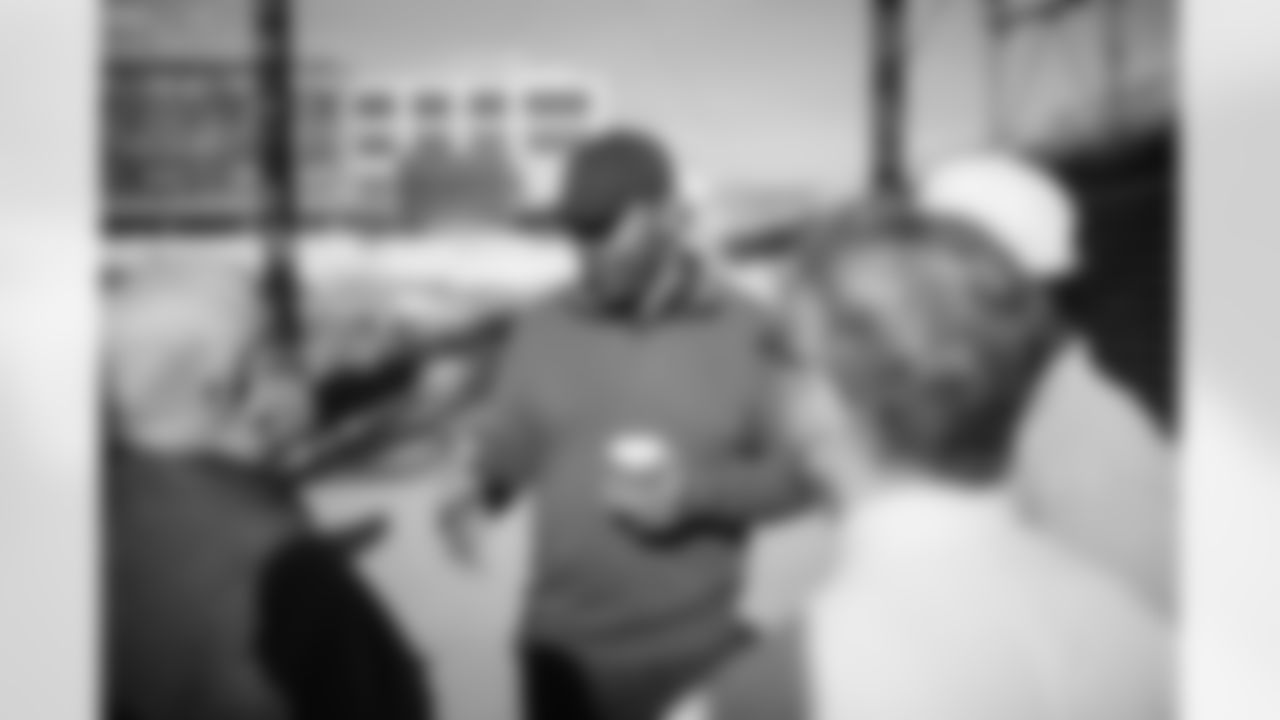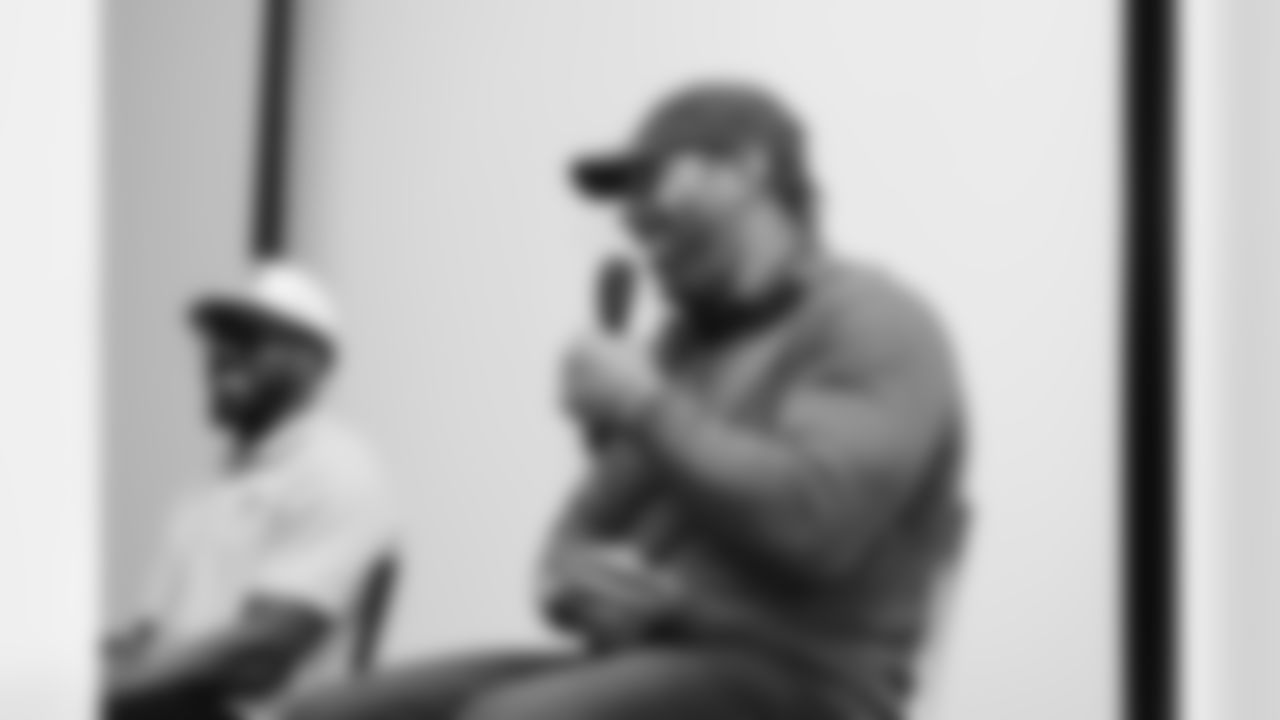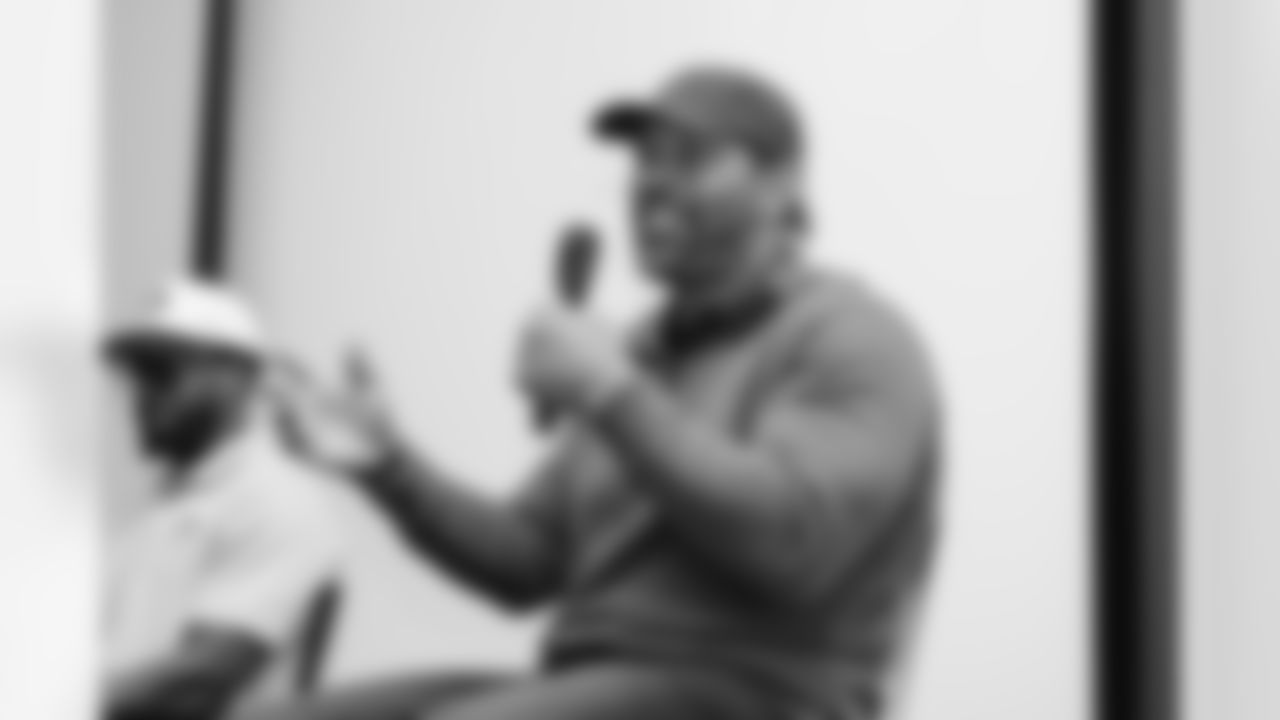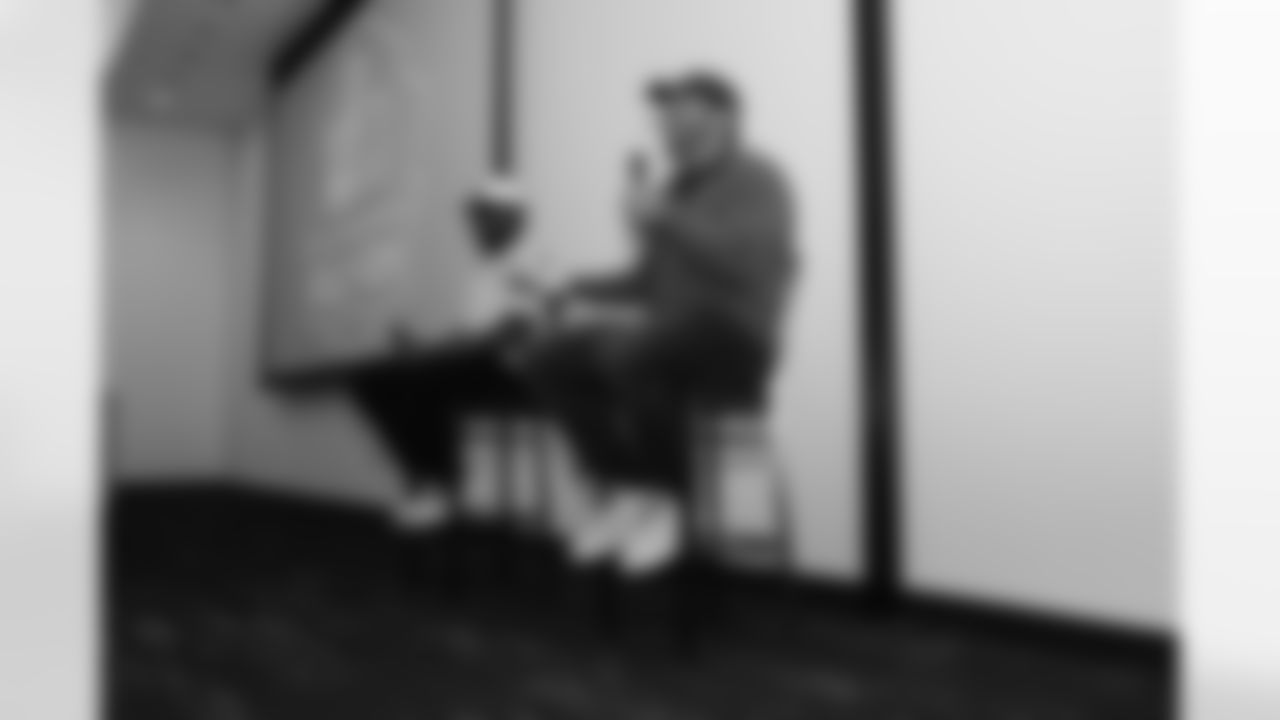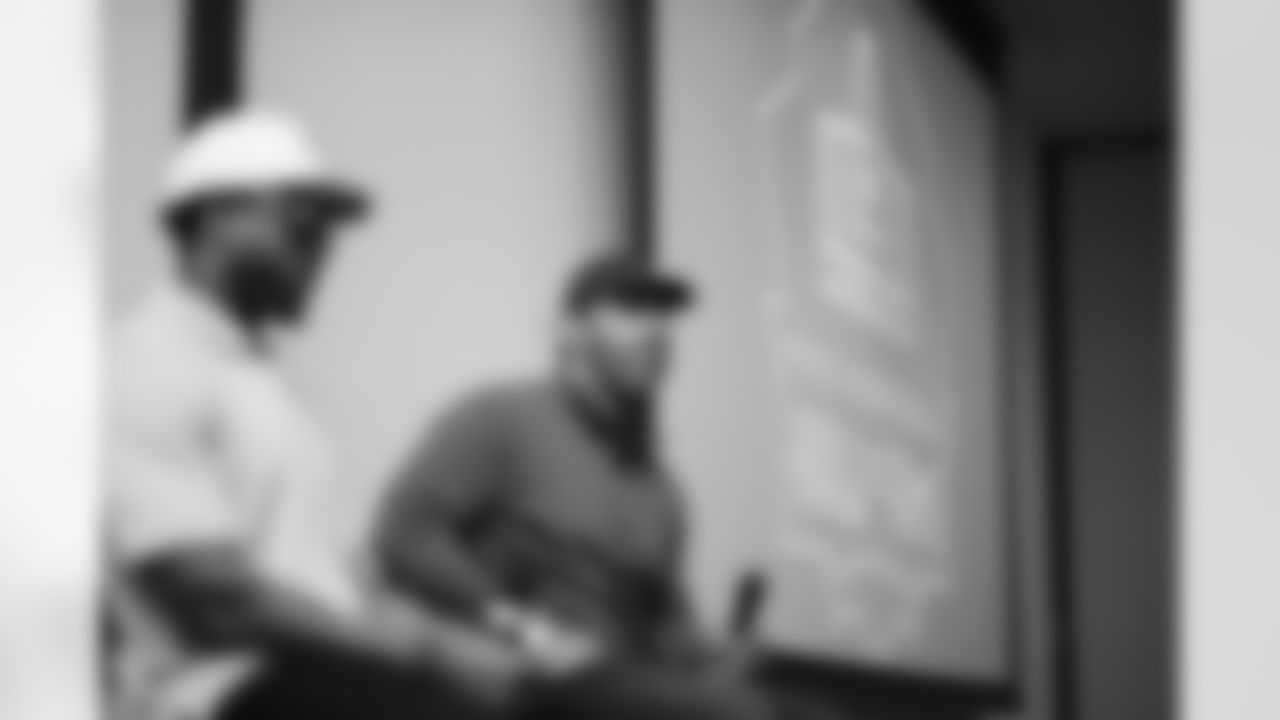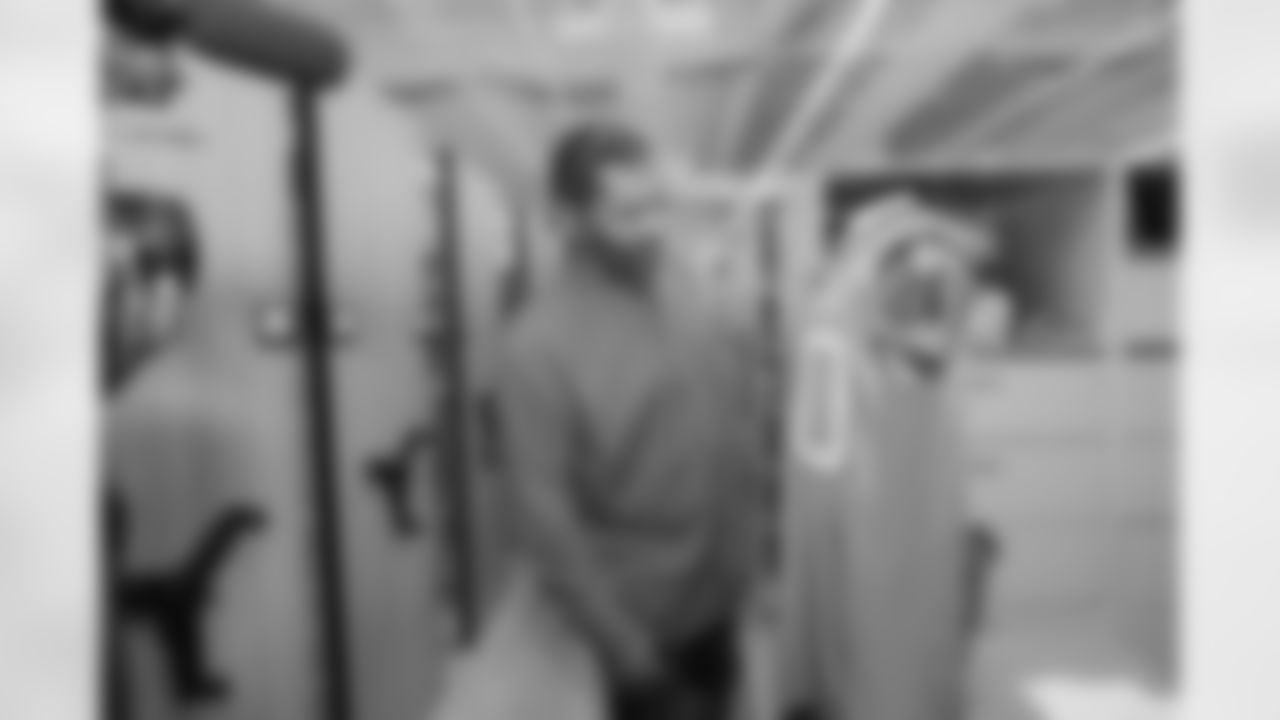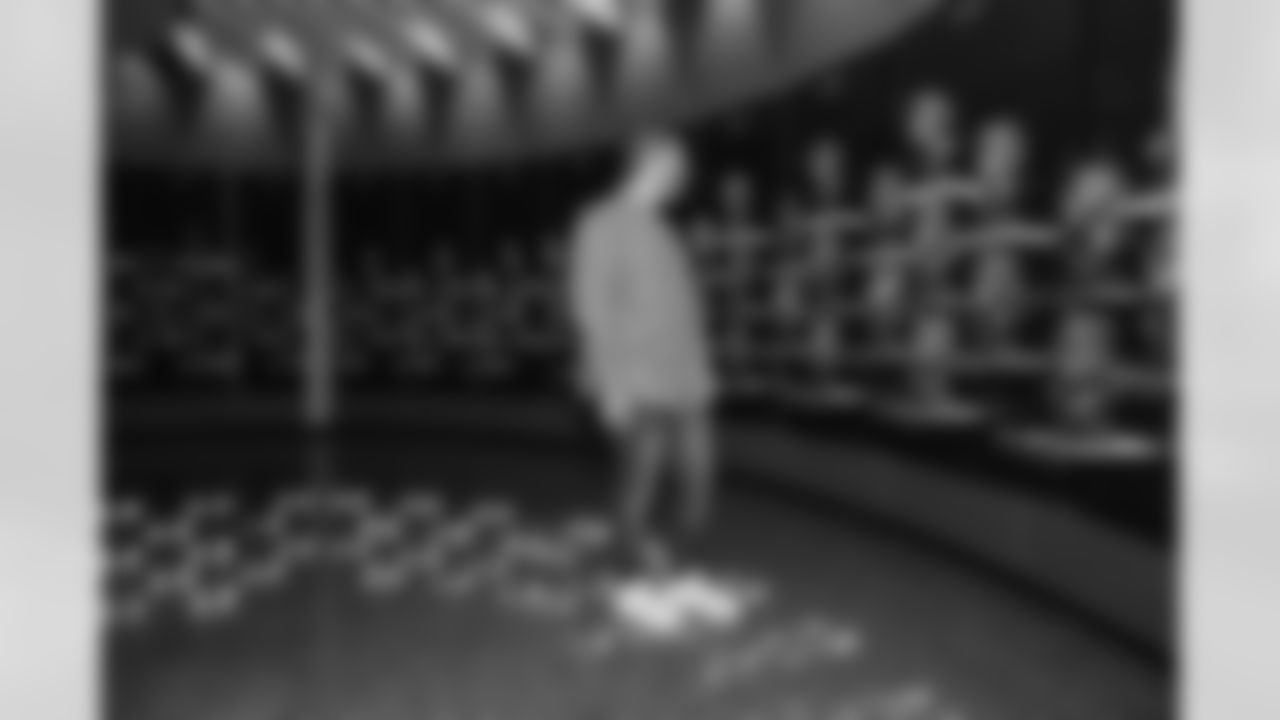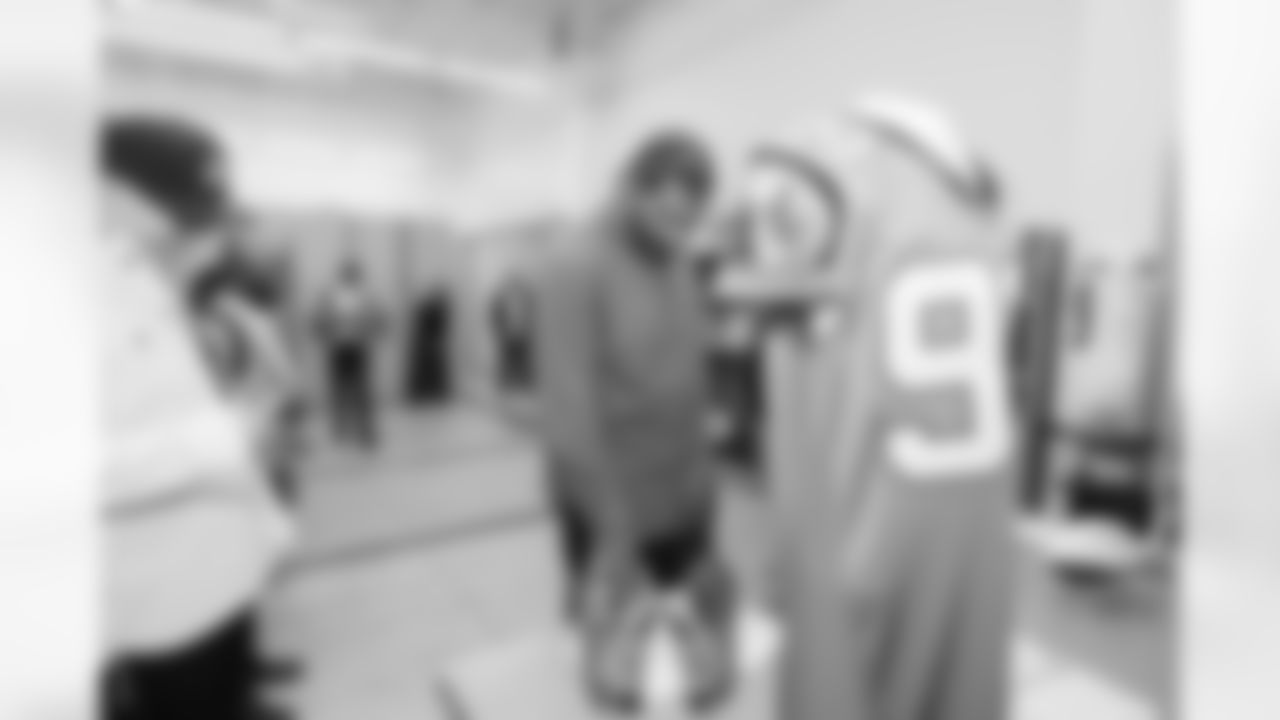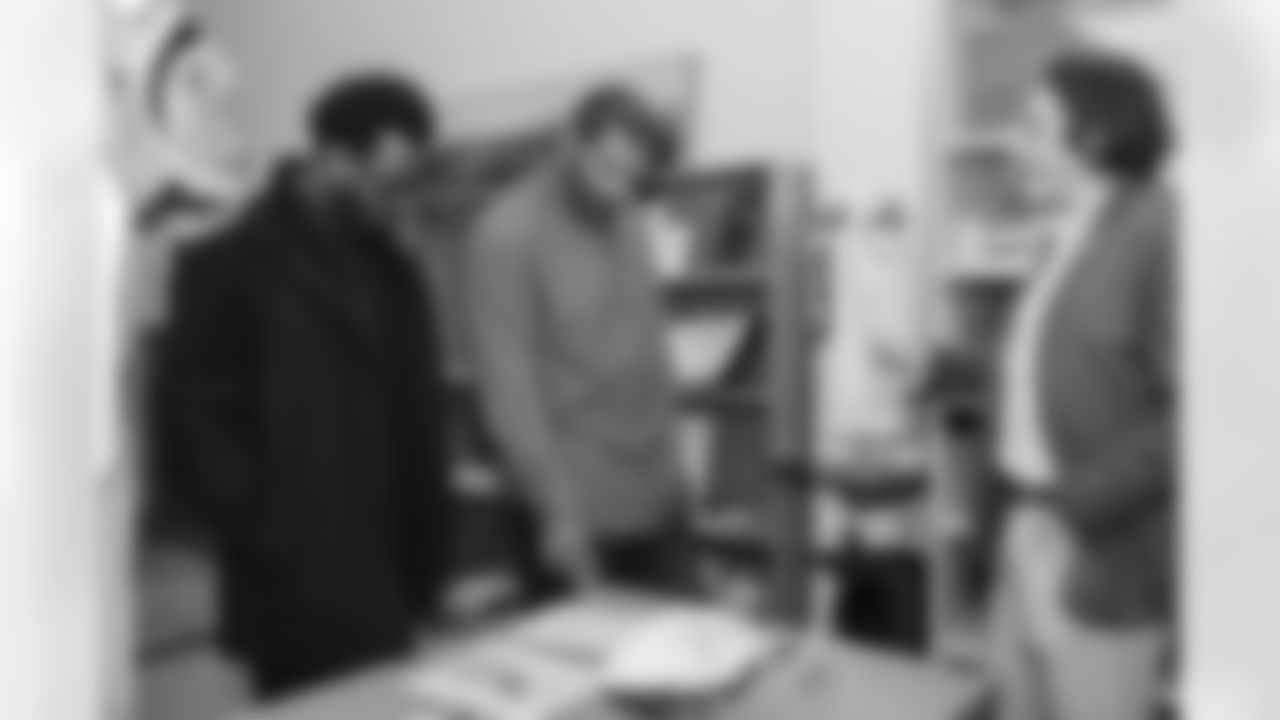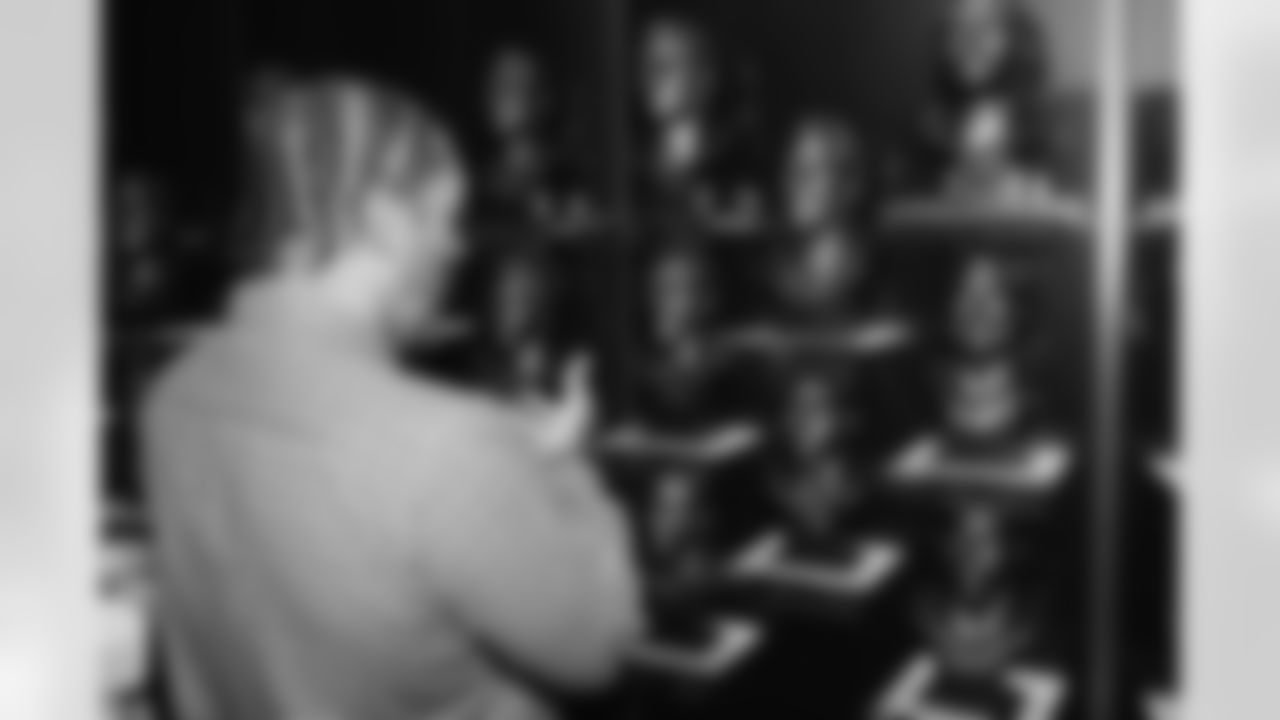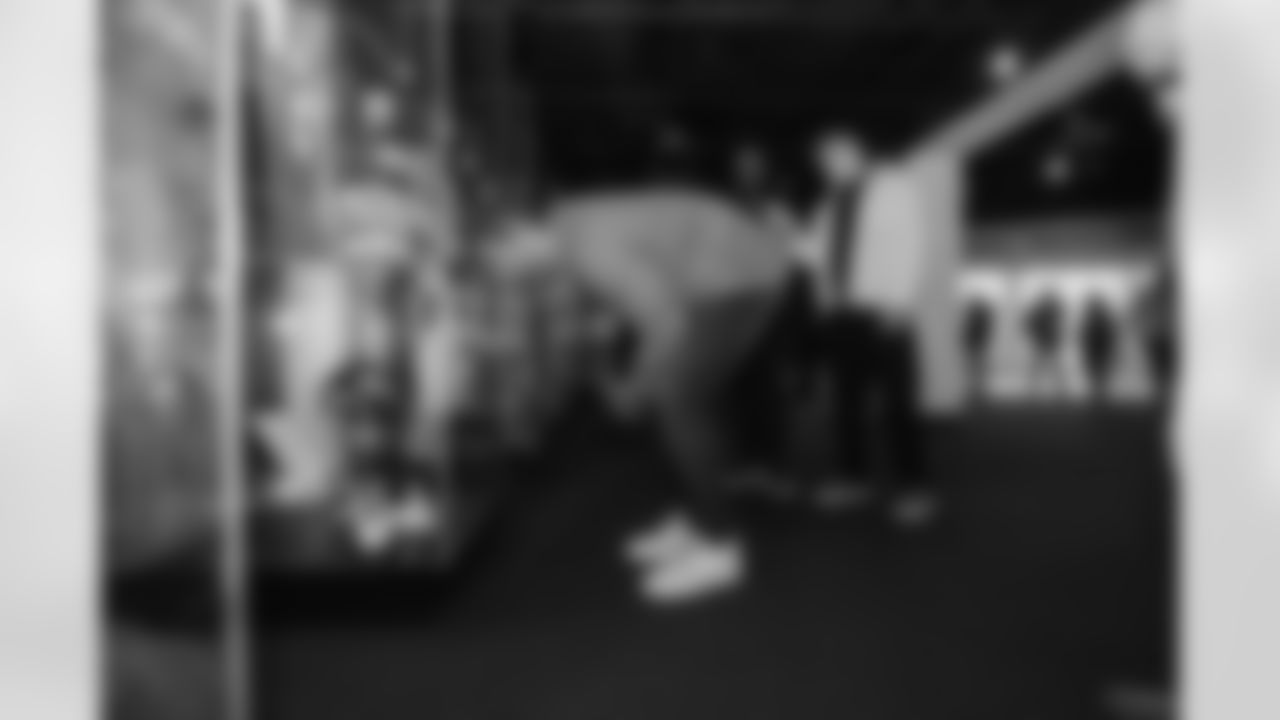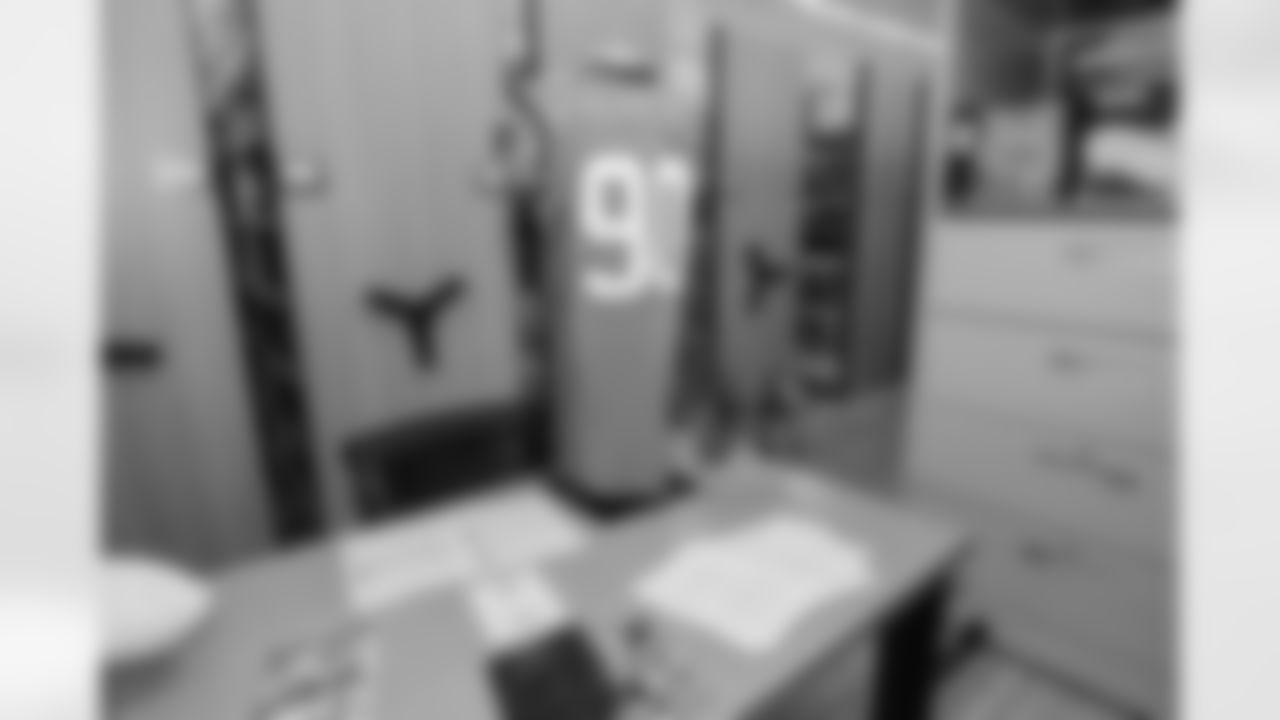CHARLOTTE — Looking back on it now, it was so obvious. How could you not see it?
But in the fall and winter of 2001 and the spring of 2002, there were moments when the NFL did one of the things the NFL does best. Because so many people spend so much time preparing for a draft — especially when you're picking near the top of it — they not only lose sight of the forest for the trees, they can walk into a hole rather than see the sequoia right in front of them.
With the second pick in the 2002 NFL Draft and the expansion Texans locked in on a quarterback with the first one, of course the Panthers were taking Julius Peppers, right?
Eventually, yes. But sometimes in the NFL, even easy things become more complicated than they need to be. And while the Panthers came to the conclusion that yes, taking a future Hall of Famer instead of a quarterback that never worked out or players who were merely good, it took a lot of time and miles in the car, and hours of conversations and months of watching tape of multiple sports to convince them of the thing that was staring them straight in the face the whole time.
Eventually, they all saw it. But it took a minute.
"I think this was one of those cases of, let's not overthink this," said Giants executive advisor to the GM Ryan Cowden, who was one of the junior members of the scouting department here at the time. He was a first-year area scout who was still riding along with veteran college scout Joe Bushofsky that spring, doing his apprenticeship and learning how to scout.
And yet, they did, for months at a time, because of the unique circumstance they were in, and the importance of getting this right.
"We got killed because we didn't take a quarterback," then-head coach John Fox said simply. "But you know, we just kind of fell in love with Julius."
Still, it was a long and complicated courtship, and after admiring him from afar, the first date didn't go as planned. The second one was better. The third, there was a definite twinkle in both their eyes. After a few months and that final meet-the-parent road trip, they were ready to commit to a relationship.
They got to the right place, eventually and obviously. They just took a circuitous route to get there.
To realize where the Panthers were that spring, you have to step back into the previous year, which was one of the worst in league history.
George Seifert, who had the highest winning percentage in NFL history and two Super Bowl rings as a head coach of the 49ers, never found his footing in Carolina. After a couple of entertaining-but-just-decent seasons in 1999 and 2000, things bottomed out in 2001. Yet there were some good players on that team — that year's draft brought middle linebacker Dan Morgan, defensive tackle Kris Jenkins, and wide receiver Steve Smith. Coupled with a stable of talent on defense like Mike Rucker, Mike Minter, Brentson Buckner, and Deon Grant, and the core of a good offensive line, it wasn't the worst place to start.
But after going 1-15 in 2001, it was clear they needed a change in direction, a lot of young talent, and, oh, by the way, a quarterback. They had drafted veteran rookie Chris Weinke (29 years old after a minor league baseball career) in the fourth round in 2001. It wasn't nearly his fault, but he did lose 14 straight starts after winning the opener in his native Minnesota (when Smith returned the opening kickoff for a touchdown), so it wasn't like they were going to build around him.
And clearly, a new regime was trying to build a particular way.
Fox and new general manager Marty Hurney came in at the same time with a plan — to build a team that was tough and smart, to weed out those who were neither, and they had a unique opportunity to do so.
Usually, in these situations, teams start with a quarterback and go from there. The Panthers signed even more veteran Rodney Peete (he was 36) to be a caretaker, but he wasn't a guy who would keep you from drafting the quarterback of the future if you had a chance. But because Houston was an expansion team and gifted the first pick that year, the Texans were the ones who had the chance to make that year's top prospect at the position the no-brainer pick. And there sat Fresno State's David Carr, that year's prize, so the Panthers were ostensibly left with the field.
And it wasn't an awful field, at least from the perspective of that moment. Now, it's obvious. Then, less so.

Oregon's Joey Harrington was the next-best quarterback that year, coming off a 23-touchdown, five-interception season for the Ducks and building a reputation for leading comebacks. Texas cornerback Quentin Jammer was a clean prospect at another premium position of need. UNC defensive tackle Ryan Sims made a lot of plays in college, and there were a couple of big offensive tackles in Texas' Mike Williams and Miami's Bryant McKinnie.
As long as the Texans did what everyone expected, that was the group the Panthers were choosing from. But even if they had a lean at that moment, they still had a lot of work to do — and had months to overthink it — before they got to that place.
So at that point, you start crossing guys off. And you have to begin with the quarterback, because if you don't have one, you can't give away a chance to get one.
"They came to me about taking the quarterback," offensive coordinator Dan Henning said. "I said, that's crazy. You're looking at a guy that comes along once in a lifetime like Lawrence Taylor, even Lawrence Taylor coming out of the same school could not be considered at that point in time as good of prospect as Julius."
In Henning's mind, Harrington was good and worth considering. But Peppers was potentially great, and you didn't pass up an elite defensive end for an OK anything. (Years later, Henning was again involved in a decision that centered on what he considered positional value. In 2008 with the Dolphins, they opted for what was then considered a generational left tackle in Jake Long rather than what was considered an above-average quarterback in Matt Ryan. Long was very good, making Pro Bowls his first four seasons before injuries derailed his career. Ryan eventually played 15 years and won an MVP. You never know.)
"None of us were in love with Harrington," Fox said simply, and there was a reason for that.
Maybe the Oregon quarterback didn't want to come to Charlotte. Maybe he saw the writing on the wall. Either way, his visit to the Panthers left a distinct impression, and it wasn't a good one.
"I don't know if he really wanted to be at that interview, to be honest with you," just-retired Panthers scout Jeff Morrow said. "I just didn't think he approached it the way your franchise quarterback should. He definitely rubbed some people the wrong way. And Joey was never really a consideration again."
When you bring a guy in for a pre-draft visit in April, they usually leave with some souvenirs, a hat, some shirts, maybe a sweatshirt, or a bag.
"He seemed to have an agenda to get in and get out," said then-director of college scouting Tony Softli. "I think he and his agent probably thought that it was going to be a long shot for him to be taken by us. He was in the mix, but he wanted to hurry up and get out of town.
"Because when I handed him a bag of like I do all the guys that come in, he told me, 'Send it to my agent; I'm going to The Masters.' I was like, 'OK, there you go.'"

With that taken care of, the decision became fairly simple.
Sims was a consideration, and Fox said the defensive tackle and Spartanburg native "was probably right then and there a better player than Julius," but didn't offer the same potential. They also were already set at that position, with an ascending star in Jenkins next to a smart and steady vet in Buckner. Similarly, the tackles weren't really on the top of their minds, since they had another decent pair at the time in Todd Steussie and Chris Terry.
In a world without Peppers, the consensus was that Jammer would have been the guy, and he played a creditable 12-year NFL career. Fox, the former DB coach, was especially fond of him. Cornerback was a need, but they got to a Super Bowl while starting Reggie Howard and Terry Cousin, proving that a great front seven can help average secondaries look better than their talent might indicate.
But when they knew they weren't taking the other quarterback that year, they kept coming back to Peppers, just a massive mountain of raw material, a part-time basketball player, and a bit of a mystery because as decorated as he was, he was still a player who needed to develop.
"Obviously he was super athletic, one of the things that we really liked about him was the upside," Fox said. "What you saw in Julius was just the room to grow. I mean, he came out as a junior, he never had a spring ball because he was always playing basketball. But he played for a Final Four basketball team. And then he was a running back in high school, I mean it was just all upside.
"And so we got murdered when we drafted him."

The prevailing thought in the national media was that a 1-15 team with Peete and Weinke couldn't afford to pass on a potential franchise quarterback like Harrington (this is your regularly scheduled reminder that draft grades are useless). And there was a narrative in 2002 that was widely disseminated that Peppers took plays off, and didn't display full effort, and might not love football.
The 17-year career, two All-Decade honors, 159.5 sacks, and this week's date in Canton seem to suggest those were off the mark.
So ultimately, as the Panthers evaluated, they kept coming back to the tape from the ground floor up.
"It's easier to look at it in hindsight now, but all the things that have been said about him, probably his whole career were the things that were echoed at the time," Cowden said of the reports he watched Joe Bushofsky file on Peppers. "Just the uniqueness of the combination of athleticism, size, power, speed, all wrapped into one body.
"It was just like this is a unique blend of all traits, with a very unassuming, quiet, humble — not to be mistaken for meek — demeanor."
(That's Cowden, second from the left in a group picture before Super Bowl XXXVIII alongside future Bills GM Brandon Beane, scout Mike Szabo, and future Giants GM Joe Schoen.)

As the scouting process moves through the fall, more eyes get laid on each guy, especially the ones at the top.
The Kentucky-based Morrow remembered all the obvious stuff about Peppers — people his size weren't supposed to be able to move like that. Coupled with the fact the Panthers needed that pass-rusher opposite Rucker at the time, and it was a logical fit.
But for all the dominant football tape, they also put together a highlight reel of Peppers' basketball work.
"And that solidified a lot of things in people's minds," Morrow said. "That a guy that big can be that athletic. So with what we had at that time, Julius was the final piece that was really going to bring us over to the top, we thought."
Softli laughs when he thinks about the basketball tape they watched in scouting meetings. In addition to the normal diligence he did as a scouting director, he had also talked to UNC basketball coach Matt Doherty and teammates about Peppers, knew about his high school and AAU exploits on the hardwood, and how athleticism translates.
"I wanted to see his explosive movements, I want to see his rebounding and shot blocking," Softli recalled. "So it was funny when I put it up on our digital draft board, I said, Foxy, take a look at this. I'd already watched it like 10 times. I couldn't get enough of it.
"It was about six or seven minutes, and Foxy just says, 'Wow.' I said, what do you think? And he just said, 'play it again.' He just kept saying, 'play it again.'"
With all that tape, they went into February with a decent idea that Peppers would be the guy — assuming the Texans weren't going to throw them a curveball. Softli was afraid Texans GM Charley Casserly might surprise them and take Peppers, at which point they might have had to reconsider Carr.
So they went to the combine, and Peppers' workout did nothing to change their minds. He came in at 6-foot-6 and change, 283 pounds, ran a 4.69-second 40, and posted a 36-1/2-inch vertical.
All the boxes just got checked.
And then came the meeting that gave them pause, and might have created some of the doubt that caused them to overthink what should have been an easy decision.
That night in Indianapolis, Peppers sat for his first formal interview with the Panthers. He walked into a room with owner Jerry Richardson, Fox and Hurney, Softli, and director of player personnel Jack Bushofsky, and what they saw that night sowed a (temporary) seed of doubt.

"That kind of set us back a little bit," Softli said. "We had everybody in there, you bring in the players to interview and I didn't say much because I had already talked to Pep and already went through my questions and process even before we got to the combine.
"But that was more to put him on the board, check the Xs and Os, and get to know his personality. And when he came in, he was very quiet. We almost had to drag questions of him. His personality was not what we had heard coming out of North Carolina from both the football and basketball staff. It was almost an introvert-type situation.
"He left the room, and we were shaking our heads and scratching our heads, going, whoa, you know, we've got to get him into Charlotte when we go for our interviews, get him in, and see if it's a different guy."
In hindsight, Softli wondered if it was simply a case of combine fatigue, as players were put through a treadmill of workouts, interviews, and medicals, pulled this way and that. Either way, it wasn't the best first impression.
So that forced them to put even more emphasis on Peppers' pro day workout in Chapel Hill, and they sent the entire building to check him out, and to poke around every corner of town looking for insight.
On the field, defensive line coach Mike Trgovac was there to run the workout, and it was intense.
"I mean, Trgo was trying to crush him," Softli recalled. "And it wasn't happening; it just was not happening. Julius did everything you wanted to see."

That day, Trgovac began working with Peppers on what was going to be a years-long project. He began working on his hand placement, the kind of fine technique point that elevates talented players to great ones. And as he worked Peppers out that day and talked to him afterward, any hesitation melted away for the defensive line coach, who would become defensive coordinator a year later.
As Trgovac studied the tape — especially the football tape — he noticed that Peppers rarely came out of the game. In college, they don't rotate stars the way they might in the NFL, so Peppers was playing practically every snap. And making a routine impact. So Trgovac just shook his head at the reports of a lack of effort.
"Julius was in there almost the whole game every game, so that was evident in that regard," Trgovac said. "Like I said, so we took it as a deal that we weren't going to listen to none of that outside noise. We're going to judge this for ourselves because this was too important for one thing, and this kid is too talented, and when we went up to meet him at North Carolina, it was clear. That was the attitude that we took on, and I don't know if there was ever a hesitation."
The tape suggested there wasn't anyway. When asked about the effort questions, Softli scoffed. He watched every snap of Peppers in college. He was convinced.
"I grade the big plays, I grade the plays where he is making a sack or a forced fumble, a tackle for loss and those plays outweighed the negative plays," the college scouting director explained. "And you also have to take into account that you're dealing with the younger player, you're dealing with a college player. And if you, if you grade the 'wows' instead of the 'whoas,' you'll come out ahead every time.
"There might have been outside noise, but no, the 'wows' were way too many. It just totally outweighed all the negative."

After the workout, Peppers came to Bank of America Stadium, where he'd meet again with the decision-makers, in smaller groups this time. That included a private meeting with Richardson, but he met with all of them again. And it was the opposite of what they saw in Indianapolis, in terms of personality.
"We came out of the draft meetings; he was in the hall with one of my assistants, and he had that Cheshire cat smile," Softli recalled. "The personality was bubbly. He was more relaxed. He didn't feel good in that panel interview-type situation at the combine. But he opened up like a flower in the hallways of the stadium offices.
"It wasn't so much what the others disqualified themselves with, but more of the transition from the Julius at the combine to the Julius in the hallway for us. And having those conversations and him smiling and his conversation with Mr. Richardson, a private conversation and then with John and Marty and then myself and Jack, that kind of turned it, you know what I mean?"
At that point, it was all but official.
"I think without anybody really saying it, I think he was kind of a lock," Morrow said. "It was kind of a thing where unless he did something unforeseen, this was it. I don't think anybody came out and said, this is our guy, but you could feel it. It was just a matter of crossing your Ts and dotting your Is. There was nobody else.
"I mean, he was one, and then you had a space, and then you had these other guys that we did our due diligence on to make sure that we're not missing anybody, but Julius was always the bull's eye, right?"

They all grew certain at their own pace. As Morrow recalls, Hurney was probably the first one to get there. The first-year GM who began his NFL career as a newspaper beat writer in Washington, he tuned out the media noise and kept them on track.
"I think Marty was for sure," Morrow said. "And again, I think Marty's probably the most underrated GM in the league over the last whatever 20 years. He was instrumental in building two Super Bowl teams there, and hired both the Super Bowl coaches. I don't think he gets nearly the credit he's due, for that call, and so many other ones."
And as they followed the GM's lead, there was one last box to check.
The week before the draft, Fox and Hurney got in the car and drove to Bailey, N.C., to see Peppers' hometown and talk to him one last time. Just to make sure.
"There was just the conviction that he wasn't a guy that got in trouble," Cowden recalled. "He was so smart. He was just everything you wanted. It was just you wanted to stamp the fact that this guy had a desire to be great and it was hard to get to know that just based off his personality, how he's very calm all the time.
"I mean, Fox and Marty made the last-minute drive over to Bailey, just the one last sit-down, because he was emotionally hard to know."
After all the work, after all the film, and after all the conversations, they just kept coming to the same conclusion.
Fox must have said the words "smart and tough" a million times during his nine years with the Panthers, and the more he thinks about it now, he's convinced that Peppers epitomized everything they were looking for as they tried to build a team from 1-15 to a Super Bowl in just two years (and then another NFC Championship Game after that).
"Julius was a smart guy, not a super verbal guy, all right, but that doesn't really matter," Fox said. "But what he was, and you saw it in enough situations, basketball was even one. I mean, I watched him go up and take the rebound and then go up again, bodies hanging all over him, slamming him. You just look at competitive toughness and it comes in all forms. It can be even another sport.
"So he was just mentally tough and you don't go to three different organizations and play 17 years without that. How do you take care of yourself during a season? He trained hard; you've got to be mentally tough to do that. We identified that, and obviously, everybody can grow, and that's what you want. But, you know, we thought that was innate within him."
The 17-year career, two All-Decade honors, 159.5 sacks, and this week's date in Canton seem to suggest that was the case.
And it all seems so obvious now.
See the Panthers Legend tour the Pro Football Hall of Fame in Canton, Ohio, where he met NFL fans and fellow Class of 2024 member Patrick Willis, and immersed himself in the museum's rich history.











